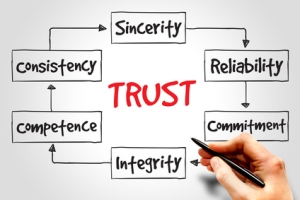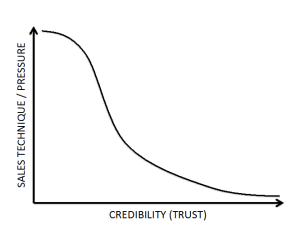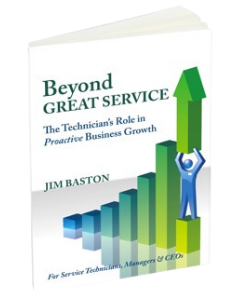Technician Sales Training – Inverse Relationship Between Trust and Technique
 In my last blog I talked about the 4 questions to ask when evaluating “sales” training for technicians. In this blog, I would like to look more closely at the inverse relationship between trust and technique when it comes to promoting services to customers.
In my last blog I talked about the 4 questions to ask when evaluating “sales” training for technicians. In this blog, I would like to look more closely at the inverse relationship between trust and technique when it comes to promoting services to customers.
I feel that the technician is in a unique position to identify opportunities that the customer can act on to help them operate their facilities and/or processes more effectively. In fact, I believe that technicians have an obligation to reach out to the customer to discuss these opportunities to help and to assist them in making informed decisions. To me, this really isn’t selling at all, but rather an important part of the service. And, this approach has a significant benefit. My experience indicates that service firms that engage their technicians in this way will create a sustainable competitive advantage and be rewarded with more business, higher customer satisfaction and unprecedented levels of retention.
Last time, I mentioned that some “sales” training programs for technicians are singularly focused on “selling” and as a result, may include sales techniques and approaches that are of limited value. That is because, in my view, sales technique is not as important as the other critical factors for success, factors such as trust, motivation and fit with company and technician culture.
A key reason for this is because the success of the technician’s efforts in applying the “sales” skills taught in a training program will depend more on the credibility that the technician has with their customers than on the “sales” techniques themselves; the higher their credibility (both personal and professional), the higher their likelihood of success. They may need some “sales” skills and practice to feel comfortable in engaging the customer in a conversation that effectively communicates their recommendation, but sales “techniques” of the kind used by “salespeople” to “persuade” a customer are largely unnecessary – and can have a detrimental effect.
My view of the relationship between technician credibility and sales technique is shown in the chart below. (This is my view based on years of experience and not on scientific research.) The vertical axis represents the amount of technique or sales persuasion needed. The horizontal axis represents the amount of credibility (trust) in the relationship. Note that where credibility is low there is a greater reliance required on technique and the ability to persuade. When the credibility is high, however, much less reliance on technique is required. Since most technicians have high levels of trust with their customers, this suggests that elaborate selling techniques and honed selling skills are not as important for as building credibility.
Training for technicians that is singularly focused on sales technique also fails to adequately take into account that success will also be dependent upon whether the technician sees this business development role as part of their responsibility. If technicians don’t recognize that the conversations with customers about how their services can help them is an integral part of the service they provide – as important as their ability to repair and maintain equipment – then they will be less likely to engage in this behaviour. In addition, if they focus on technique at the expense of building trust, they might be perceived as merely selling and lose the trust advantage they had in the first place.
All this is to say that there is a lot a stake when engaging technicians in business development activities and that training to engage technicians in promoting services should be more than teaching them how to sell. Doing this well with engaged, right-minded service technicians can create a sustainable competitive advantage that will be hard for your competitors to duplicate. Doing this poorly, with service technicians focused on technique at the expense of trust building can have the opposite effect and result in less business and lower margins.
I welcome your feedback. You can connect with me via telephone or email or leave a comment right here on the site. And as always, please feel free to leave a link back to your own blog if you have one via the commentluv feature here on the site. If you are reading this blog post via email, you will need to locate this post on my website by clicking here. Scroll down to the bottom of the page where you will find the comment section.
Jim
“Trust is the highest form of human motivation”
– Steven R. Covey






Leave a Reply
Want to join the discussion?Feel free to contribute!